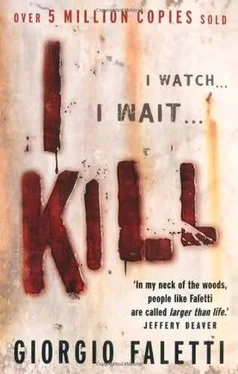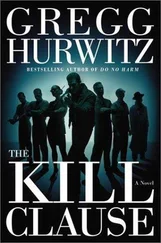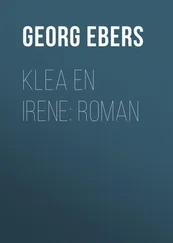‘Who?’
‘The Larkins. We caught them red-handed this time. Without any bombs. There was a gunfight and Jeff Larkin got killed. There was a mountain of drugs and a bigger mountain of cash. And papers. We have promising new leads. With a little luck, there’s enough material to nail them all.’
‘Fine.’He had repeated the same word, in the same tone of voice, but his boss hadn’t picked up on it this time either. He imagined Homer Woods in his panelled office, sitting at his desk, phone in hand, his blue eyes framed by gold-rimmed glasses, as immutable as his grey three-piece and blue button-down shirt.
‘Frank, we got to the Larkins mostly because of your work, yours and Cooper’s. Everyone here knows it and I wanted to tell you. When do you think you’re coming back?’
‘I don’t know, to be honest. Soon.’
‘Okay, I don’t want to pressure you. But remember what I said.’
‘Okay, Homer. Thanks.’ He had hung up and gone out to look for Harriet. She was sitting on the veranda watching the two kids dismantle their sailboards and load them on to their jeep.
He had sat down in silence next to her on the wooden bench. They had watched the beach until the jeep was gone. It was as if that outside presence, though far away, had kept them from speaking.
‘He wants to know when you’re coming back to work, doesn’t he?’ Harriet had asked, breaking the silence.
‘Yes.’ There had never been lies between them and Frank had no intention of starting now.
‘Do you want to?’
‘Harriet,’ Frank had said, ‘I’m a policeman.’ He had turned to her but Harriet had carefully avoided meeting his gaze. He, too, had gone back to watching the ocean; the waves chasing each other in the wind, white with foam. I didn’t choose this life because I had to. I like it. I’ve always wanted to do what I do and I don’t know if I could adjust to doing anything else. I don’t even think I’d know how. As my grandfather always said, you can’t fit a square peg into a round hole.’ He had stood up and put a hand on his wife’s shoulder, now slightly stiff. ‘Harriet, I don’t know whether I’m square or round. But I don’t want to change.’
He had gone back into the house and when he had come out a while later to look for her, she had disappeared. Her footprints on the sand in front of the house went in the direction of the dunes. He had seen her walking in the distance by the shore, a tiny figure with hair flying in the wind. He had followed her with his gaze until two other dunes had hidden her from view. He thought she wanted to be alone and that it was only right. He had gone back into the house and sat down at the table, in front of food he would never want to eat.
Suddenly, he had not felt so sure about what he’d said earlier. Maybe there was another life for the two of them. Maybe someone who was born square couldn’t become round, but he could try to round off the edges so that nobody would be hurt. Especially those he loved. He had decided to give himself a night to think it over. He would talk to her about it the next morning. He was sure that together they could find a solution.
There was never to be a next morning for the two of them.
He had waited until late afternoon for Harriet to return. As the sun set and the shadows of the dunes lengthened over the beach like dark fingers, he had seen two figures walking slowly along the shore. The reflection of the fiery sunset had made him narrow his eyes. They were still too far away for him to make them out clearly. Watching through the open window, Frank could see the footprints they left with every step, a trail that started from the dunes on the horizon. Their jackets flapped in the breeze, their silhouettes shimmering in the sea air. When they were near enough for him to see them clearly, Frank realized that one of them was the sheriff from Honesty.
He had felt the anxiety rise up inside him as he finally came face-to-face with the man who he considered more an accountant than a policeman. But Frank’s worst fears were about to become a reality as, holding his hat in his hand and trying to avoid Frank’s eyes as much as possible, the sheriff had told him what had happened.
A couple of hours earlier, some fishermen had been sailing a few hundred yards from the coast and they had seen a woman fitting Harriet’s description. She was standing at the top of a cliff, strangely jutting out above the coastal dunes. She was alone and looking out to sea. When they were just about opposite her, she had jumped. Not seeing her emerge from the water, the fishermen had immediately turned their boat around to go to the rescue. One of them had dived into the ocean right where she had jumped but they could not find her. They had called the police right away and started searching. So far they had found nothing.
The ocean had returned Harriet’s body two days later, when the current had carried it to an inlet a couple of miles south of the coast.
When he had identified her body, Frank had felt like an assassin before his victim. He had looked at the face of his wife lying on the mortuary slab and, nodding, confirmed both Harriet’s identity and his own lie sentence. There had been no inquest thanks to the fishermen’s testimony, but that did not help to free Frank of the remorse consuming him. He had been so busy taking care of himself that he had not noticed Harriet’s deep depression. No one had noticed it. But that was no excuse. He should have noticed his wife s agitation. He was supposed to understand. All the signals had been there, but in his own delirium of self-pity, he had ignored them. And their conversation after Homer’s phone call had been the last straw. When you got right down to it, he was neither square nor round. Just blind.
He had left town with his wife’s body in a coffin without even going back to the house to pack.
‘Mummy, there’s a man crying.’
The child’s voice shook Frank from his trance. Next to him, the mother of the little blonde girl in a blue dress hushed her and smiled at him in embarrassment. She hurried away, pulling her daughter by the hand.
Frank did not realize that he was crying, nor for how long. His tears came from far away. They were not tears of salvation, nor oblivion, but just relief. A small truce to let him breathe for a moment, feel the heat of the sun, see the colour of the sea, and listen to his heart beating under his shirt without the sound of death, just for once. He was paying the price for Harriet’s death, sitting on a bench in the garden of the St James Clinic where they had admitted him on the verge of a nervous breakdown. He had understood it definitively months later, with the World Trade Center disaster, when he had watched on television as the buildings fell. Men hurtling planes against skyscrapers in the name of God, while someone sitting comfortably in an office knew how to exploit their derangement on the stock market. Other men earned their living by selling land mines, and at Christmas they bought their children presents with money earned by killing and maiming someone else’s children. Conscience was an accessory whose value was tied to fluctuations in the price of oil. And in the middle of all that, it was no surprise if, from time to time, there was someone who wrote his own destiny in blood.
I kill…
Remorse for Harriet’s death was a cruel travelling companion that would never leave his side. It alone would be enough punishment for a lifetime. He would never forget until his dying breath. And he would never be able to forgive himself. He could not end the insanity in the world. He could only try to end his own, hope that those who could would follow his example, and erase those two words or others like them. He sat on the bench and cried, ignoring the curious passers-by until he had no tears left.
Читать дальше










